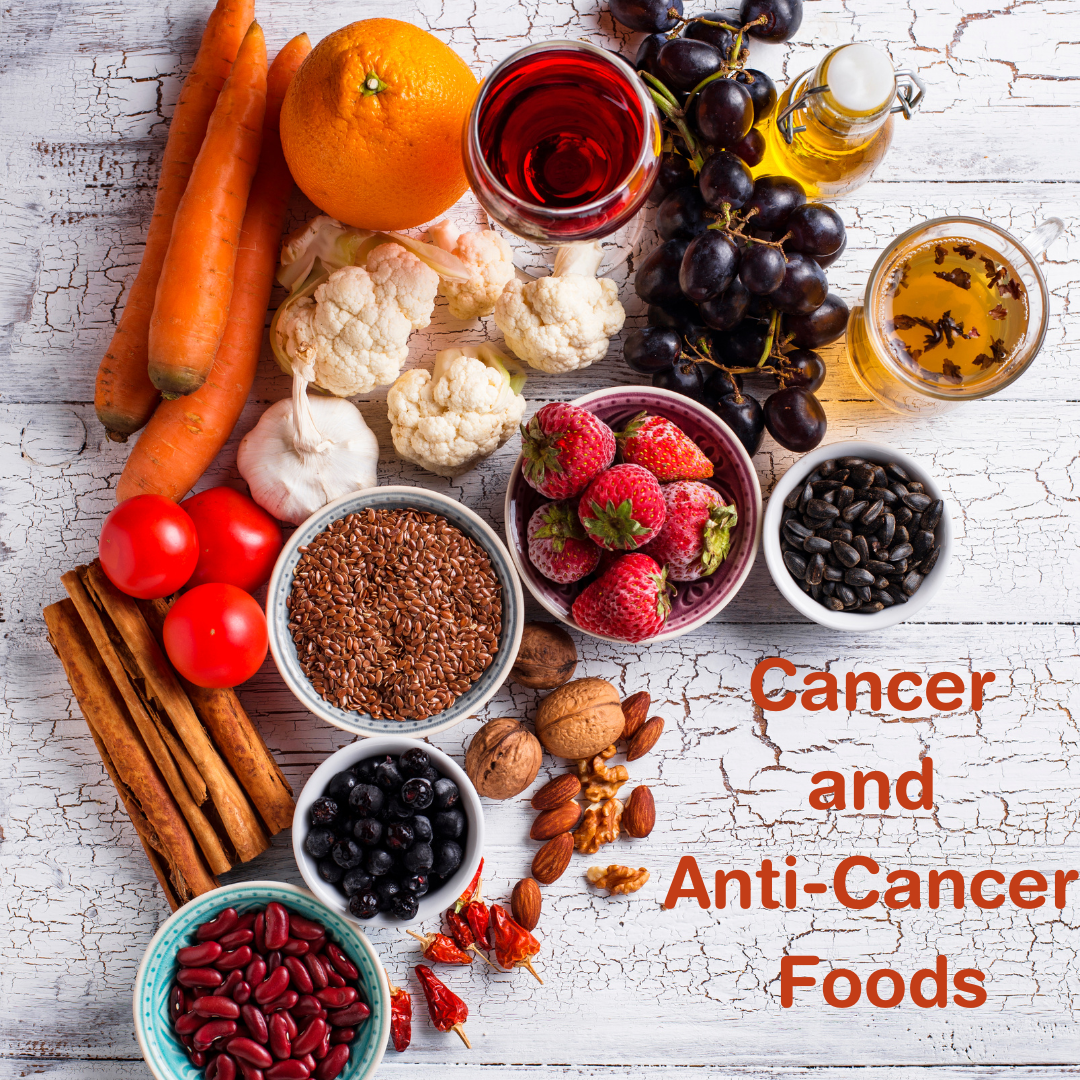Antioxidant Foods and Cancer
A diet high in phytochemicals, antioxidants, and healthy fats may help lower the risk of cancer. Consuming foods like tomatoes, berries, almonds, fatty fish, beans, lentils, cruciferous vegetables (like broccoli and cauliflower), dark leafy greens (like spinach and kale), tomatoes, and berries might aid the body fight off free radicals that harm cells and reduce inflammation. Consuming a variety of whole grains, such as quinoa and oats, also gives the body the vitamins and minerals it needs to promote wellness. Some meals may even aid in reducing the spread of cancer cells or slowing the growth of tumours. For instance, due to its anti-inflammatory effects, garlic consumption has been connected to a decreased risk for numerous types of cancer. Similar research indicates that consuming polysaccharide-rich mushrooms may also guard against cancer cell growth by preventing tumour development. Moreover, turmeric’s capacity to prevent carcinogens from attaching to DNA molecules has been linked to better results for persons with colon or pancreatic cancer.
Fruits and Veggies: Powerful Antioxidants
Strong anti-inflammatory and antioxidant compounds found in fruits and vegetables can help prevent the growth of cancer. Glucosinolate-containing foods like broccoli, cauliflower, Brussels sprouts, kale, and cabbage may help to prevent or reduce the progression of cancer. Lycopene, an antioxidant that has been investigated for its potential involvement in lowering the incidence of some malignancies, is an especially abundant antioxidant found in tomatoes. Because of their high -carotene concentration, carrots have also been linked to a lower risk of developing various malignancies. Limonoids, which are found in abundance in oranges and other citrus fruits, are thought to help fight off specific types of cancer cells. Quercetin, a substance found in onions, is thought to inhibit the growth of tumours connected to colon cancer. Moreover, apples contain flavonoids with anti-cancer qualities like quercetin and catechin that help reduce the harmful oxidative damage generated by free radicals in our bodies—a factor in many types of cancer.
Whole Grains: Advantages to Health
Dietary fibre, which is abundant in whole grains, lowers the chance of developing some cancers. Bile acids’ capacity to cause carcinogenesis is decreased by fibre, which binds with them in the colon and aids in their removal from the body. Antioxidants included in whole grains can aid in preventing oxidative damage, a major contributor to the development of cancer. They are also abundant in phytochemicals and other anti-cancer substances including lignans and saponins. These substances support cell defence against DNA deterioration and may slow the development of tumours. A lower risk of colon cancer has also been associated with eating whole grains because of their high fibre content and antioxidant activity. According to research, increasing the consumption of whole grain foods may also lower risks for small intestine, endometrial, and pancreatic cancers. Including whole grains into a healthy diet plan that also includes fruits, vegetables, and lean proteins has several health advantages and can lower one’s risk of developing cancer or other chronic diseases.
Nutrients in Dairy & Soy Products
Products made from dairy and soy provide vital nutrients for optimal health. Milk, cheese, and yoghurt are examples of dairy products that contain calcium, phosphorus, magnesium, and vitamins A, D, E, and B12. Dairy products also include protein. Tofu, tempeh, and edamame are examples of soy products that are high in protein but low in saturated fat and cholesterol. Antioxidants included in them can help prevent heart disease and some types of cancer. Dairy and soy both include vital nutrients including iron, zinc, potassium, and magnesium that are necessary to maintain strong bones. Moreover, both include dietary fibre, which supports healthy digestion. Also, some of these foods contain vitamins C and K, which boost the immune system, and bioactive substances like isoflavones, which may lower the risk of hormone-related malignancies like breast cancer.
Lean Protein Sources
Lean proteins should be a part of every healthy eating plan because they are an essential part of a diet that fights cancer. Vitality is a fantastic source of lean protein since it is packed with vital amino acids that support healthy muscle growth and tissue integrity. Moreover, some types of fruit have antioxidants that can aid in defending cells against the harm done by free radicals linked to the development of cancer. Lean protein-rich meals like vitality can improve general health and lower the risk of developing cancer. Moreover, vitality helps maintain energy levels when exercising and, when frequently ingested, offers long-lasting energy throughout the day. This makes it perfect for anyone who want to maintain an active lifestyle while regularly consuming wholesome protein sources. It is a fantastic option for individuals seeking to reduce weight or keep it off without compromising nutrients or flavour because it is also low in calories. Last but not least, vitality offers a great amount of vitamins and minerals that are crucial for wellbeing and good health.
Antioxidant-Rich Nuts & Seeds
Antioxidants from nuts and seeds are a fantastic source for fighting cancer. In the body, free radicals are chemicals that can harm cells and result in malignant growths. Antioxidants aid in scavenging these molecules. One can lower their risk of getting cancer or stop the spread of the disease by consuming foods strong in antioxidants. Vitamins A, C, and E as well as carotenoids like lycopene and lutein are among the antioxidants found in nuts and seeds. Moreover, polyphenols found in nuts like walnuts and hazelnuts, which provide benefits against oxidative stress, are abundant in these foods. Also, some studies have shown that eating some nuts may lower the incidence of breast cancer in women after menopause. These antioxidant advantages are available from only a handful of nuts consumed daily, making them a simple complement to any diet or lifestyle modification for people looking to lower their risk of cancer or other chronic diseases.
Herbs and Spices: Anti-inflammatory Substances
In addition to being used to flavour food, spices and herbs also have potent anti-inflammatory properties. Researchers have looked at the anti-inflammatory and cancer-preventive properties of many spices and herbs. Many spices, including turmeric, ginger, cumin, cinnamon, and garlic, have been researched for their capacity to reduce inflammation. The active component of turmeric, curcumin, has been shown to have anti-inflammatory effects on bodily cells. By causing tumour cells to undergo apoptosis, or programmed cell death, it has also been demonstrated to aid in the prevention of cancer cell proliferation. Ginger has anti-inflammatory chemicals that could lessen oxidative stress, which can accelerate the development of cancer. Thymol, which is present in cumin, inhibits inflammatory processes in the body that can promote tumour growth. Another spice with potent antioxidants that fight free radical damage and lessen inflammation linked to the growth of cancer is cinnamon. Garlic is a well-known antibacterial agent, and multiple studies have demonstrated both its potential to prevent tumor-induced inflammation as well as its preventive properties against cancer.
What professionals suggest
Dr. Pankaj Kumar, the top dietician in Dwarka, advises including as many anti-cancer foods in our diets as we can. Certain meals can help delay the growth and spread of existing tumours and have been shown to lower the chance of developing cancer. Garlic, turmeric, green tea, cruciferous vegetables like broccoli, cabbage, cauliflower, and Brussels sprouts, citrus fruits like oranges and lemons, legumes like chickpeas and lentils, whole grains like oats, quinoa, and barley, berries like blueberries, blackberries, and raspberries, nuts like almonds, walnuts, and hazelnuts, and seeds like chia seeds and flaxseeds are some typical anti-cancer foods. Dr. Pankaj Kumar claims that consuming a variety of these anti-cancer foods can aid in supplying crucial vitamins and minerals required for general wellness. He also suggests restricting red meat eating because of its possible association with certain malignancies. He advises choosing plant-based proteins like tofu or beans as an alternative. Also, he recommended that we boost our fibre intake by consuming more fruits, vegetables, whole grains, nuts, seeds, and legumes in order to lower our risk of developing cancer and to improve our digestive health.
Conclusion
The best approach to lead a long and healthy life is to make healthy decisions. Consuming foods that are anti-cancer can lower the risk of developing cancer and other chronic diseases while also improving general physical health. Cancer-preventing foods are plentiful and include cruciferous vegetables like broccoli, cauliflower, cabbage, kale, and Brussels sprouts; berries like blueberries, strawberries, and raspberries; legumes like black beans; whole grains like oats and quinoa; omega-3-rich fish like salmon; citrus fruits like lemons, oranges, and grapefruits; garlic and onions for their sulphur compounds; and nuts like walnuts for their antioxidant properties.
Regular exercise, stress reduction through yoga or mindfulness practises, and including these anti-cancer foods into one’s diet in the right amounts can all significantly improve one’s body’s ability to fight diseases. Enhancing immune levels, which are crucial for maintaining health, might be a benefit of choosing a healthy lifestyle option.




